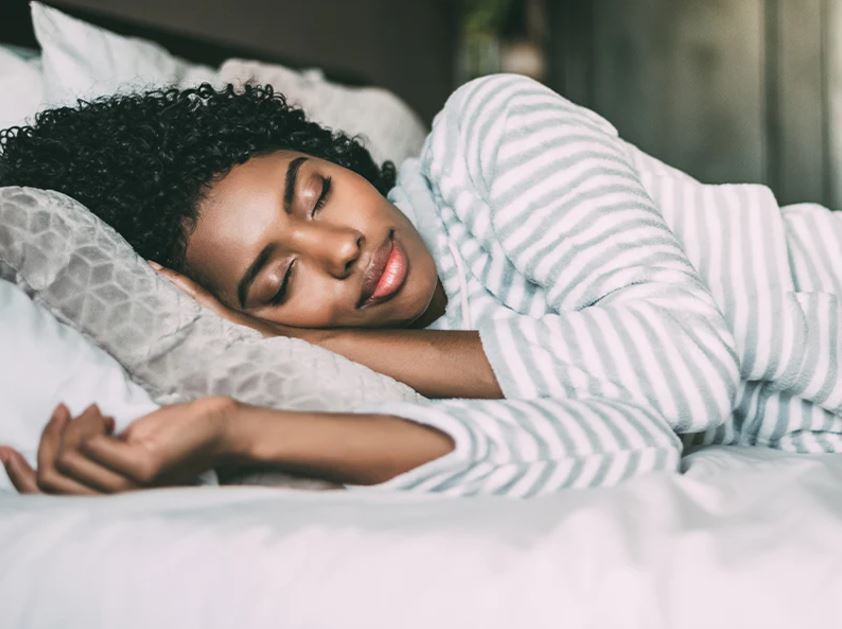9 Best Herbs & Supplements to Sleep Better at Night
It’s not a food or drink, but our bodies require it for survival. Yep, that would be sweet, precious sleep. And getting a good night’s sleep is something many people struggle with. But maybe it doesn’t have to be that way! Let’s look at some wonderful herbs to help sleep, and easy ways you can add them to your routine for a restful, restorative night.
Why is Sleep So Important?
Sleep is a prime example of the importance of recovery. The human body has an amazing ability to heal, and it’s directly tied to our sleep. Our bodies undergo constant battering from the daily grind of stress and physical activity. Sleep is our recovery mode when our cells and minds naturally restore themselves. Sleep also improves overall quality of life.

Sleep for Heart Health
Sleep is needed to help your heart repair after a hard day’s work. It lets your blood vessels take a crucial recovery period. In fact, those who lack sleep have higher risks of heart disease, Type 2 diabetes, and high blood pressure.
Sleep for Healthy Weight
Sleep deficiency also increases risk for obesity. If you don’t sleep enough, the hormone ghrelin increases. Higher ghrelin means you feel hungrier all day, which is linked to weight gain.
Sleep for Cognitive Function
Researchers have linked sleep with learning and the formation of memories. People who get more sleep are more productive at work and school.
Sleep for Growth
Did you know that you stand a little taller after a good sleep? Our bodies stretch around .3 inches while sleeping, meaning you’re at your tallest when you wake up. Then your body will compact as you go through your day. Also, if you’re an athlete looking to build muscle mass, you should know that growth hormone secretion happens—you guessed it—during sleep.
The History of Herbs Used for Sleep
Herbs have a strong tradition of use as insomnia remedies and soothing sleep aids. We know that humans have a remarkable relationship with the plant world as a source of medicine, inspiration, and sustenance. Use of natural herbs for sleep goes far back in the recorded history of herbalism. In Ayurveda, a traditional medical system dating back thousands of years, the amount of sleep you need depends on your dosha (your mind and body type). Some people need 8 to 9 hours, while others may feel rested with 6 or 7 hours. The Ayurveda methodology acknowledges individualism in its approach to sleep. Every person is different and finding the right sleep routine is deeply personal.
Herbs to Help You Sleep Better
Sleep herbs are such valuable allies. It’s hard to pick just 9, but these are some favorites to help your body find restful balance. While these are numbered, it’s important to note that there is no top sleep herb for everyone! Everybody has their own relationship with the plant chemistry found in an herb. Sometimes a combination of herbs is helpful. Sometimes it’s just one herb that works for you to have a better night’s sleep. Natural sleeping remedies include herbal teas, tinctures, supplements, aromatherapy, and sometimes dried herbs in a “sleep pillow” that will scent the air near your bed. In this blog, we’re focusing on herbs commonly used in sleep supplements.

Tart Cherry
Tart Cherry or Prunus cerasus is also known as Sour Cherry or Dwarf Cherry. Tart Cherry differs from its relative the sweet cherry. It has a higher acid content and it’s self-pollenating. These little red gems are rich in anthocyanins (a plant pigment with antioxidant action). While they don’t have as many as the dark purple Black Elderberry, they do have a different variety of them.
Tart Cherry is tied to sleep because it is a source of natural melatonin. Yes, that sleep hormone that your body naturally produces at night is also present in some plants! A study on sleep quality found that participants given Tart Cherry slept longer and had less need for naps. Analysis showed that their melatonin levels increased during the study. The placebo group noticed no changes to their sleep schedules.
Valerian Root
Valerian Root not only has rich lore, but it has long traditional use as a natural sleep aid. The name Valerian comes from the word valere in Latin, meaning “to be strong.” Women used to be given Valerian to treat hysteria, and it was thought of as “herbal valium.” Science supports its soothing reputation with multiple studies showing Valerian’s ability to improve sleep quality.
Valerian is notable for its powerful, earthy scent. The odor was believed to have aphrodisiac qualities and women carried the herb to attract suitors. Valerian was worn by brides in Sweden to ward off jealous elves. The mythical Pied Piper was said to have used Valerian to help him escort rats out of town. (Who knew the Pied Piper was supposedly a gifted flautist and an herbalist?)
What’s cool is that it takes the power of whole Valerian to work properly, rather than one popular compound that’s isolated out. Often in herbalism, a single constituent is said to be the “it” factor for an herb. (Think Turmeric and the compound Curcumin, or Black Seed and the compound Thymoquinone.) Valerian does not have a single “it” factor. Instead, its sedative power is attributed to multiple phytochemicals in the plant acting together. That’s herbal synergy in action!
Holy Basil
Holy Basil, also known as Tulsi or Ocimum sanctum, is another favorite calming herb. A member of the mint family (Lamiaceae), Holy Basil has also been called “The Incomparable One” and the “Queen of Herbs.” Holy Basil can be a nice addition to a routine that sets you up for a good night’s sleep. Tulsi has been traditionally used in Ayurveda.
Stress is pervasive in our world, and the stress you experience during the day could prevent you from getting a good night’s sleep. Holy Basil is an adaptogen. It helps your body adapt to situation around it—in this case, stress. Holy Basil supports the body’s ability to balance cortisol, a powerful stress hormone. It may also support the secretion of the happy hormone serotonin.
Holy Basil is abundant in beta caryophyllene (BCP), a terpene also found in cannabidiol (CBD). Terpenes are aromatic metabolites, meaning they are responsible for the distinct smell of Holy Basil. BCP is known for interacting with your cannabinoid receptors in your body and may support the body in a similar way to that hypothesized with CBD. Read our Holy Basil blog for more on this wonderful herb.
Lemon Balm
Lemon Balm, like its sister Holy Basil, is a member of the mint family. Melissa officinalis is known for its ability to support GABA levels in the brain. Lemon Balm contains high amounts of rosmarinic acid. When rosmarinic acid interacts with the receptors in your brain, the GABA activity usually results in feelings of relaxation.
Lemon Balm is linked to mitigating stress levels in the body. Research has also tied it to a more restful night of sleep when paired with Valerian. On its own, an extract of Lemon Balm was found to help lower insomnia levels in study participants by 42%.
If you’re interested in this calming herbal companion, try Lemon Balm Force. New Chapter uses two types of extracts to give you the full-spectrum power of the whole plant. You’ll also find Lemon Balm in our Perfect Postnatal multivitamin blend, supporting healthy mood for postpartum moms.*
Chamomile
Chamomile tea is famous for being a relaxing beverage, whether hot or iced. There are two kinds of chamomiles: German Chamomile and Roman Chamomile. German Chamomile ( Matricaria recutita) has a delicate, fern-like leaf pattern, with a sweet small flower reminiscent of a daisy. It grows to be almost two feet high. (Chamomile belongs to the same family as daisies, Asteraceae.) Roman Chamomile (Chamaemelum nobile) has thicker leaves and grows to a stunted three to four inches high.
For herbal use, only the German Chamomile will do. It abounds in oils like bisabolol and matricin, as well as a type of flavonoid called apigenin. Apigenin has a similar effect on the brain as the phytochemicals found in Lemon Balm. It interacts with GABA receptors in the brain to help you feel relaxed. Chamomile was found in research to support a higher level of sleep quality in the elderly.
Lavender
Lavender has a pleasant scent and a history as an aphrodisiac. Lavandula angustifolia is also a member of the prestigious Lamiaceae family. (Basil, mint, rosemary, sage are all part of this family!)
When we think of Lavender, many people think of aromatherapy and perhaps rubbing lavender oil between their hands before bed (which has been shown to help you have a restful slumber). There’s also a history of internal usage of lavender. Supplemental lavender has been found to be neurologically calming to the body. If you’ve ever had a restless mind before sleep, Lavender could be tremendously helpful.
Hops
The smell of Hops is fresh and spicy, like evergreens. Hops are the seed cones of the Hops plant. Humulus lupulus is a bine, not a vine. A bine grows shoots in a helix around a support, while a vine climbs using tendrils or suckers.
While many of us may be familiar with a delicious hoppy beer, this herb has been used traditionally for helping with restlessness and supporting sleep. Hops may be combined with Valerian to add a calming effect to Valerian’s sleep benefits. Hops, like some of the other herbs discussed above, may help support calm by mingling with your GABA receptors. So, the next time you reach for a hoppy beer, know that it may not be the alcohol helping you to find your mellow. It could be thanks to this amazing herb! In fact, non-alcoholic beers sometimes feature large amounts of hops to give you that soothing beer taste. In research, a hoppy non-alcoholic beer was found to help nurses sleep better.
Passionflower
Passiflora incarnata has a beautiful purple and blue flower with a stunning yellow center. The look of Passionflower has been tied to the Christian tradition. The five sepals and five petals are said to represent the ten disciples (minus Judas and Peter), and the corona was said to represent Jesus’s crown of thorns. Used traditionally since the 16th century (and probably before), Passionflower is another botanical that may help to increase GABA levels in the body, helping to regulate mood.
While traditional usage is rich for this gorgeous plant, human research has not quite caught up. The findings on sleep and passionflower, like its ability to increase deep sleep and help with falling asleep more quickly, occur in animal research. Keep an eye out for clinical research in the future, as Passionflower shows a lot of promise.
Ashwagandha
Ashwagandha is THE herb of the moment. Many people are fascinated by this herb’s history as a rasayana in Ayurveda, helping to support body’s response to stress. Ashwagandha is a member of the Solanaceae (nightshade) family. Its name means “smell of the horse” in Sanskrit. It is debated whether that is due to Ashwagandha’s earthy smell or its reputed ability to give one the power and potency of a horse. A stalk-like plant with red berries, most often the root and sometimes the leaves are used in herbal medicine.
Withania somnifera is interesting for its versatility. While the Latin word “somnifera” translates to “sleep inducing,” many people take Ashwagandha during the day for its stress-balancing properties. It can also be taken in the evening to help support restful sleep. While other botanicals may have a more immediate effect, Ashwagandha has a building effect and takes a few weeks before its full effects are realized. Read more about this trending superfood in our Ashwagandha benefits blog.
Supplements for Sleep Support
Combining herbs and fine-tuning them to work holistically with different systems in the body is, in my opinion, an art form. At New Chapter, we look at each whole plant’s properties, traditional uses, and chemical profile to determine which herbs will partner well together. Each herbal sleep formula is balanced to deliver support in areas of need. Turmeric Force Nighttime helps you enjoy restful sleep using time-tested herbs such as Chamomile, Hops, Valerian Root, and Lemon Balm.* One of our latest supplements for sleep and recovery combines powerhouse herb Ginger (known for inflammation-balancing and digestive support) with the optimal amount of quality-assured melatonin to support those who may be struggling to get sleep due to pain.*† Many people also enjoy an evening serving of our Magnesium + Ashwagandha blend that marries these two powerful ingredients for relaxation and calm.*
Additional Sleep Tips
Your nighttime routine does not begin at night! Good sleep has foundations throughout your day. When people ask about herbs and suggestions for how to fall asleep better, some are surprised when herbalist inquire about their morning routine, their stress levels, and their physical activity during the day. The truth is, all of these can compromise our sleep. So, think about your whole day and how you can better support your own sleep. A few additional tips to set the stage for sleep:
- Limit blue light from screens before bed. Screen time tricks your body into thinking it’s still daytime. This can inhibit your natural production of melatonin. Also, turn off or block out excess light in your bedroom, as this also confuses melatonin production.
- Limit caffeine after 2 pm. It’s said our body is biphasic and we are most tired at 2 AM and 2 PM. It can be tempting to reach for coffee or an energy drink at 2 PM. But keep in mind that caffeine has a “half-life” of around 5 hours (the time it takes to eliminate half of what you’ve ingested). Your caffeine buzz may last longer than you want it to and affect sleep.
- Make sure your minerals are balanced. Many of us are deficient in Magnesium, and this mineral is necessary to help your body relax. When suggesting Magnesium supplements for sleep, we like Magnesium bisglycinate that promotes relaxation with low risk of GI effects.
The average person spends about 26 years of their life sleeping. Supporting sleep is not a waste of time. It means you’re supporting your body’s ability to recover and bounce back with vigor. Explore these herbs to help you sleep and adjust other habits to find what works for you. Then turn out the light and experience a restful night. Good night!
† Occasional pain following exercise
Shared from https://newchapter.com/blogs/wellness-blog/9-best-herbs-supplements-to-sleep-better-at-night




